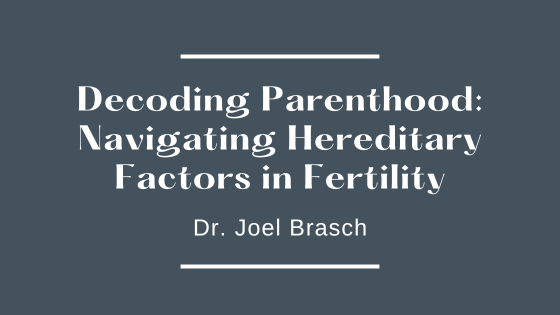Fertility is a complex web of various factors, both environmental and genetic. While advancements in reproductive science have opened new doors for individuals and couples struggling with infertility, understanding the role of genetics in fertility remains paramount. Hereditary factors wield significant influence, often shaping one’s reproductive journey in unexpected ways. In this blog, we delve into the intricate relationship between genetics and fertility, exploring key considerations and implications for those seeking to conceive.
Genetic Variability and Fertility:
Human fertility is subject to considerable genetic variability. Genes governing reproductive hormones, gamete quality, and reproductive tract development can profoundly impact fertility outcomes. Variations in these genes may manifest as conditions like polycystic ovary syndrome (PCOS), endometriosis, or male factor infertility, highlighting the genetic underpinnings of reproductive health.
Inheritance Patterns:
Understanding inheritance patterns is crucial for assessing the hereditary component of fertility-related conditions. Some disorders, like cystic fibrosis or sickle cell anemia, follow Mendelian inheritance patterns, wherein a single gene mutation that is inherited from one or both parents can significantly affect fertility. In contrast, complex conditions such as infertility often involve the interplay of multiple genes, environmental factors, and lifestyle choices, making their genetic basis more challenging to unravel.
Genetic Testing:
Advancements in genetic testing offer invaluable insights into an individual’s fertility potential and risk of hereditary conditions. Preconception genetic screening enables prospective parents to identify carrier status for genetic disorders, empowering them to make informed family planning decisions. Furthermore, fertility clinics increasingly utilize genetic testing techniques like preimplantation genetic testing (PGT) to screen embryos for chromosomal abnormalities or monogenic disorders, enhancing the success rates of assisted reproductive technologies (ART).
Epigenetics and Fertility:
Beyond DNA sequence variations, epigenetic modifications play a crucial role in regulating gene expression patterns relevant to fertility. Environmental exposures, lifestyle factors, and even parental experiences can influence epigenetic marks, potentially impacting fertility across generations. Understanding the interplay between genetics and epigenetics offers new avenues for exploring the complexities of fertility and developing personalized interventions.
Ethical Considerations:
While genetic insights can inform fertility decisions, they also raise ethical dilemmas. Issues like the possibility of unintended consequences, privacy concerns surrounding genetic information, and disparities in access to genetic testing must be carefully navigated. Balancing the benefits of genetic knowledge with ethical considerations is essential to ensure equitable and responsible use of genetic technologies in reproductive healthcare.
Genetics significantly influences fertility outcomes, shaping individuals’ reproductive journeys in profound ways. By unraveling the genetic underpinnings of fertility-related conditions, we gain valuable insights into reproductive health and family planning. Embracing genetic knowledge empowers individuals and couples to make informed decisions, optimize fertility treatments, and navigate the complexities of parenthood with greater confidence and understanding. As we continue to unravel the mysteries of the genome, the synergy between genetics and fertility holds promise for advancing reproductive healthcare and enhancing the prospects of parenthood for generations to come.

